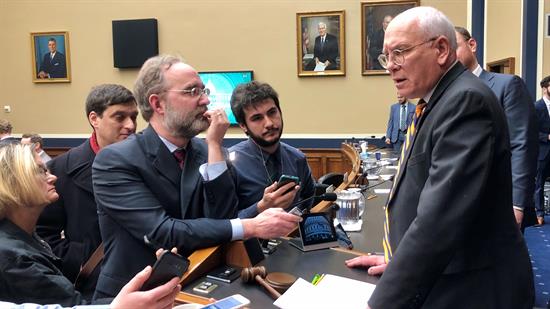- Home
- About
-
Constituent Services
- Academy Nominations
- Community Project Funding
- Congressional Art Competition
- Congressional App Challenge
- Congressional Commendation
- Event Invitation
- Grants
- Help with a Federal Agency
- Internships
- IRA Clean Energy Consumer Benefits
- Know Your Rights: Immigration
- Request a Meeting
- Request Surplus Books
- Presidential Greeting
- Visit Washington D.C.
- Issues & Legislation
- News
- 20th District
- Contact

Press Releases
Tonko Calls Out EPA Administrator Zeldin for Slashing Protections to Environment & Public HealthDuring subcommittee hearing, Tonko highlights cuts to EPA that threaten its key mission to protect public health & the environment
Washington,
May 20, 2025
WASHINGTON, DC — Congressman Paul D. Tonko, Ranking Member of the Energy and Commerce Subcommittee on Environment, today questioned Environmental Protection Agency (EPA) Administrator Lee Zeldin during an Environment Subcommittee hearing on the EPA’s Fiscal Year 2026 budget. Listen to Rep. Tonko’s opening remarks HERE and see below as prepared for delivery. President Trump’s Fiscal Year 2026 budget request for EPA has been called “problematic,” “an unserious proposal,” and “maybe a bridge too far to be achievable.” These were the reactions of Republican Appropriators last week, and I expect you will hear even less charitable reviews from Democrats on this Subcommittee today. This proposal includes a 55% reduction from FY25 levels, resulting in agency funding levels not seen since the mid-1980s. If enacted, this would fundamentally dismantle the EPA as we know it and cripple the agency's ability to carry out its core mission of protecting the air we breathe and the water we drink. The request includes devastating cuts that will undermine states’ efforts to protect public health and carry out their obligations, including a $2.46 billion reduction to the State Revolving Funds for water infrastructure and a $1 billion reduction for categorical grants, which are critical to supporting staffing of state environmental agencies. I believe this is part of a disturbing trend we are seeing to force more costs onto state governments, as is being done with the proposed cuts to Medicaid in the majority’s reconciliation bill. Similar to these funding cuts, earlier this year the Administration expressed a desire to reduce EPA staffing levels by 65%, which would return the agency to 1971 personnel levels — the agency’s second year in existence. It is not credible to suggest that the agency can fulfill its statutory requirements — including all the major environmental laws and amendments to those laws that have been enacted since the 1970s — with these proposed staffing levels. Cuts of this magnitude would not only hollow out the agency’s expertise and capacity, but they are insensitive to the public servants who have dedicated their lives to supporting the agency’s mission. And it is worth reminding everyone of what that mission is: To protect human health and the environment. In just a few short months, I believe the agency, under Administrator Zeldin’s leadership, has lost sight of this mission. Mr. Zeldin launched the “Powering the Great American Comeback” initiative focused on American energy, auto manufacturing, and artificial intelligence dominance. And broadly speaking, I am not necessarily opposed to aspects of that agenda, but I also do not believe it is the appropriate role for our nation’s environmental regulator to be leading this effort. Because EPA’s contributions to those goals more or less translate to how can we reduce environmental protections and enforcements of those protections for the benefit of energy producers, the auto industry, and Big Tech, even if ordinary Americans will pay the price by breathing harmful air pollution, drinking contaminated water, and being exposed to dangerous chemicals. We have already seen a slew of agency actions that will result in greater pollution and reduce our scientific capacity to understand how that pollution will impact Americans’ health and well-being. This includes reconsidering rules that protect Americans from pollution from power plants, vehicles, and industrial facilities, and weakening standards to keep PFAS out of our drinking water. Each of these public health protections up for reconsideration went through robust rulemaking processes and economic analyses, which found that every one of these rules delivers greater benefits to the American people, in public health and economic benefits, than they cost. I am also concerned by EPA’s efforts to terminate previously awarded grants without producing any evidence of fraud, waste, or abuse. For each of those awards, the previous administration carried out competitive selection processes based upon requirements enacted by Congress. Whether or not Administrator Zeldin personally believes Congress was wasting taxpayer dollars when it directed EPA to carry out those funding opportunities is irrelevant. No Administrator should be the sole arbitrator of what is a good use of Congressionally-directed taxpayer dollars, and yet we have seen billions of dollars impounded without justification. Finally, I am very concerned by reports that EPA is planning to eliminate the Energy Star program, which is a voluntary, non-regulatory labeling program with strong support from industry and consumers. Energy Star has been incredibly effective at supporting American manufacturing, enabling people to lower energy bills, and reducing strain on our electricity system. This seems obviously in line with the President’s energy and economic agenda, and yet, there may be an effort underway to terminate the program. If we cannot even find common ground on a broadly popular, voluntary, low-cost program to benefit consumers, I have serious doubts that we will be able to find anything to agree upon this year. Mr. Administrator, I appreciate you being here, and I hope we can work together to ensure that your agency and this committee have a productive, transparent relationship that honors the critical public health and scientific mission of the EPA. |
